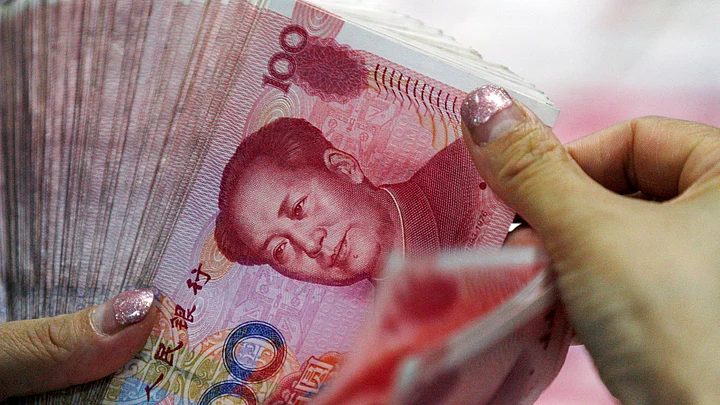China Trade Halted After Equity Rout
China accelerated the depreciation of the yuan on Thursday, sending currencies across the region reeling and domestic stock markets tumbling, as investors feared the Asian giant was kicking off a trade war against its competitors.
Trading on China’s stock markets was suspended for the rest of the day, for the second time this week, as a new circuit-breaking mechanism was tripped less than half an hour after the open.
The People’s Bank of China (PBOC) again surprised markets by setting the official midpoint rate on the yuan, also known as the renminbi (RMB), at 6.5646 per dollar, the lowest since March 2011.
That was 0.5 percent weaker than the day before and the biggest daily drop since last August, when an abrupt near 2 percent devaluation of the currency also roiled markets.
- Chinese central bank cut yuan reference rate by the most since August last year.
- Domestic stock markets tumble 7 percent, triggering trading halt.
- Markets are struggling to determine what policy Beijing is pursuing.
- Some fear the yuan’s quickening slide suggests the economy is in deepening trouble.
- China regulator unveils rules to restrict selling by big shareholders.
Starting 9 January, they can’t sell more than 1 percent of a listed company’s share capital every three months.
Central Bank’s Weak Yuan Fixing Creates Panic
The PBOC’s China Foreign Exchange Trade System (CFETS) repeated on Thursday that there was no basis for the yuan’s continuous depreciation and that it was stable against a basket of currencies in 2015.
But the central bank’s fixings have helped drive the yuan down not just against the dollar this week, but also other major currencies, including a 3.5 percent fall against the yen and 0.8 percent against the euro.
The markets are struggling to determine what policy Beijing is pursuing.
Oversea-Chinese Banking CorporationFrankly speaking, we are still not quite sure where the PBOC boundary is at the current stage. The fear of the unknown has become the largest risk for RMB in the near term, despite China’s sizable current account surplus.
ANZ bank noteThe policy action will also create one-way expectation of RMB depreciation, propelling capital flight and leading to significant financial instability.
Macro Data Worries May Trigger Further Selloff
This week’s slide comes ahead of the expected release later in the day of China’s foreign exchange reserve data for December, which traders fear will show a further sharp decline as investors pull money out of the slowing economy.
China’s reserves, the world’s largest, fell by $87.2 billion in November to $3.44 trillion, the lowest level since February 2013 and the third-largest monthly drop on record.
Some fear the yuan’s quickening slide suggests the world’s second-largest economy is in deepening trouble, though for now economists say there has been no material change in their expectations of a gradual but bumpy slowdown, with no hard landing.
Stock Fright
A sustained depreciation in the yuan puts pressure on other Asian countries to devalue their currencies to stay competitive with China’s massive export machine.
It also makes commodities denominated in US dollars more expensive for Chinese buyers, which could hurt demand and thus further depress commodity prices in a vicious chain reaction.
Equities markets were also notable and immediate casualties, especially domestic Chinese shares.
Shanghai stocks slid 7 percent to trigger the halt in trading, a repeat performance of Monday’s sudden tumble. Japan’s Nikkei shed 1.8 percent in sympathy.
The halt mechanism, intended to calm market volatility, was having the opposite effect, according to a 22-year-old retail investor in Guangzhou surnamed Hu.
Traders Trapped by Circuit Breakers
He said he bought shares on Wednesday when the market rebounded, but was now trapped by the circuit breaker, which he said was “killing investors” and creating panic.
China’s securities regulator also unveiled new rules on Thursday to restrict selling by big shareholders who have been locked into their holdings for six months since Beijing banned them from offloading stocks to arrest a summer market crash.
In rules that take effect on 9 January, they can’t sell more than 1 percent of a listed company’s share capital every three months.
The new rules didn’t go down well with investors.
Alberto Forchielli, Founder of Mandarin Capital PartnersThis is crazy. Chinese regulators set off on this path in July and they cannot get out of it. They have ruined whatever hope investors still had in the market.
(At The Quint, we question everything. Play an active role in shaping our journalism by becoming a member today.)
